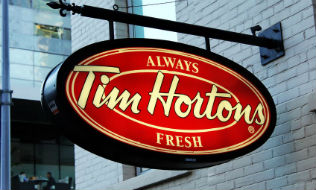

Controversy continues to swirl as politicians have started weighing in on moves by some Tim Hortons franchises to cut benefits and paid breaks in response to a hike in Ontario’s minimum wage.
The issue began to heat up this week in response to changes at two Tim Hortons franchises in Cobourg, Ont., which are owned by Ron Joyce Jr. and Jeri-Lynn Horton Joyce, who are the son and daughter of Tim Hortons co-founders Ron Joyce and the late Tim Horton. A letter to employees blamed the recent minimum wage increase for changes that would boost employee contributions to their health benefits and eliminate paid breaks. Since then, the CBC has reported that Tim Hortons franchise owners in Leamington and Port Hope, Ont., have taken similar steps around paid breaks, as have multiple other locations in Cobourg and an owner of six franchises in the Durham region near Toronto.
Read: Ontario minimum wage hike blamed for benefit cuts at two Tim Hortons outlets
According to The Canadian Press, Ontario Premier Kathleen Wynne said Ron Joyce Jr. should come to her if he wants to challenge government policy instead of taking it out on his workers. She also said she wants him to change his mind on the decision to cut back benefits and paid breaks.
Wynne told the CBC that asking workers to sign pledges to agree to unpaid breaks or less pay than the actual hours they worked is unfair. “To be blunt, I think it’s the act of a bully. And if Mr. Joyce Jr. wants to pick a fight, pick that fight with me and not the people who are working at the service window of the stores,” she told the CBC.
Ontario New Democratic Party labour critic Cindy Forster feels the cuts are premature. “At the very least, we should wait and see a little bit about whether or not there’s any impact to local businesses with respect to the wage increase,” she says. “I think Tim Hortons does OK. And they continue to raise their prices every year, regardless of minimum wage increases. They continue to raise their prices and reduce the sizes of their products.”
Forster says she hopes not to see similar moves across the retail and service sectors and suggests Tim Hortons locations should step back and assess the situation later in the year.
Have your say: Are new labour law changes a concern for employers?
“I don’t think anybody is going to complain if you increase the price of your coffee by 10 cents to make sure that the people who are working for you are actually making a living wage and perhaps have a few benefits that other people in other sectors enjoy,” she says.
While it’s likely the majority of employees in the service sector work part-time and, therefore, may not have access to benefits and pensions, cutting the offerings that do exist for those workers isn’t the way to go about balancing the budget after the minimum wage increase, says Forster.
The current issues surrounding the Tim Hortons locations have also shown something of a divide between some of the company’s franchisees and the corporation itself. An official statement from Tim Hortons’ corporate office noted “these recent actions by a few restaurant owners . . . do not reflect the values of our brand, the views of our company or the views of the overwhelming majority of our dedicated and hardworking restaurant owners.”
“While our restaurant owners, like all small-business owners, have found this sudden transition challenging, we are committed to helping them work through these changes,” the company said in the statement.
